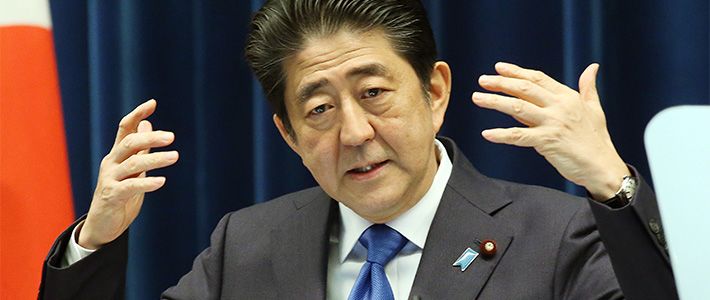
Fiscal Concerns Grow as Abe Again Postpones Consumption Tax Hike
Politics Economy- English
- 日本語
- 简体字
- 繁體字
- Français
- Español
- العربية
- Русский
Prime Minister Abe Shinzō announced on June 1 that he would postpone raising the consumption tax from 8% to 10% until October 2019. The decision marks the second time for Abe to delay the hike, putting it a full four years later than planned. It was initially slated to take effect in October 2015 but was pushed back to April 2017 over recessionary concerns.
During the press conference announcing the postponement Abe pointed to risks to the world economy from such factors as a slowdown in emerging and developing economies, saying his decision was necessary to prevent a drop in domestic demand.
An About Face
Abe had consistently denied postponement rumors, stating on November 18, 2014, that “there will be no further postponements.” He reasserted this stance on September 24 the following year, proclaiming that nothing short of a financial crisis on the scale of 2008 would keep the plan from going ahead. His resolve began to waver at the start of this year, however, after economic indicators hinted at a global slowdown. On January 19 he called for close and careful scrutiny of data to determine if the world economy was in retreat. Then on March 14 he called into question the logic of raising the consumption tax if the result would be a decline in other revenue sources.
The government had planned to use the revenues from a higher consumption tax to cover mounting pension, health insurance, and other social security deficits. Many of Abe’s closest economic advisors, including Yale University professor Hamada Kōichi and former Finance Ministry bureaucrat Honda Etsurō, have pushed for expansionary policies to revive Japan’s stalled economy, while officials at the Finance Ministry have been calling on the prime minister to prioritize fiscal consolidation.
Abe decided to side with the former following a meeting with international finance and economy experts in March, including Columbia University professor Joseph Stiglitz and City University of New York professor Paul Krugman. The two Nobel Laureates cited weaknesses in the global economy and discouraged Abe from going ahead with the tax hike, providing the prime minister with the mandate he needed to put the plan on hold.
G7 Summit Tips the Scales
Abe also used the G7 summit as a platform to support his plan for extending the tax increase, stressing the looming threat of global economic crisis to world leaders gathered at Ise-Shima. Not all heads of state were onboard, however, as French President François Holland openly rejected the idea of an impending downturn. Despite the obvious divide, Abe assured reporters after the summit that G7 leaders had shared his concerns, and he vowed to adopt the stimulus measures needed to “rev up the Abenomics engine.”
Senior Finance Ministry officials, who had strongly advocated a tax hike as scheduled, note that Abe’s tone began to change in March and that the G7 summit had convinced him to abandon the hike idea. Finance Minister Asō Tarō initially opposed the delay, arguing that such a decision would require a vote of confidence from the public and that the prime minister would need to call a snap election. But following a three-hour meeting with Abe on May 30 Asō deferred by saying, “I’ll support the prime minister’s decision.”
Many see Abe’s move as providing a short-term boost to the economy. Polls also showed overwhelming support for the decision, giving the prime minister a boost of confidence ahead of a House of Councillors election in July.
The longer-term outlook is less clear, however, and opinions vary on what the fallout will be. Chairman of the Japan Association of Corporate Executives Kobayashi Yoshimitsu has offered candid advice on the need to restore fiscal health, saying that without additional tax revenues, deep cuts in social security benefits and other painful reforms would be unavoidable.
A Double Burden for Abe
Japan faces serious demographic challenges due to an aging, shrinking populace. The National Institute of Population and Social Security Research projects the population will shrink from 128 million in 2010 to 116.6 million by 2030 and to 86.7 million by 2060. Of special concern is the decline in the working-age population—those aged 15 to 64. This demographic is expected to drop by nearly half, plummeting from 81.7 million in 2010 to 44.2 million by 2060. As a share of the total population, this represents a reduction from 63.8% to 50.9%.
These figures assume that Japan’s total fertility rate will gradually decline from the 2010 level of 1.39 to 1.33 by 2024 before eventually stabilizing at 1.35. The rate rose to 1.46 in 2015, sparking hope that the dwindling trend would progress slower than predicted. The slight uptick, however, is well short of the 2.07 needed to maintain the population at the current level.
Abenomics seeks to build a prosperous society through economic growth and to use the resulting increase in tax revenue to achieve fiscal consolidation. Achieving growth, though, requires higher productivity from a larger workforce—a difficult proposition amid current demographic realities. To this end, the government has introduced initiatives to support women and the elderly in taking more active roles in society. However, it is unclear to what degree these will succeed in mitigating labor shortages and boosting productivity.
By postponing the consumption tax hike Abe has invited renewed scrutiny of his trademark policies for economic growth. And as Japan’s economy continues to struggle, pressure is mounting for him to guide the nation out of its troubled fiscal waters.
(Originally written in Japanese by the Nippon.com editorial department and published on June 1, 2016. Banner photo: Abe announces at a press conference he will delay increasing the consumption tax to 10%. © Jiji.)